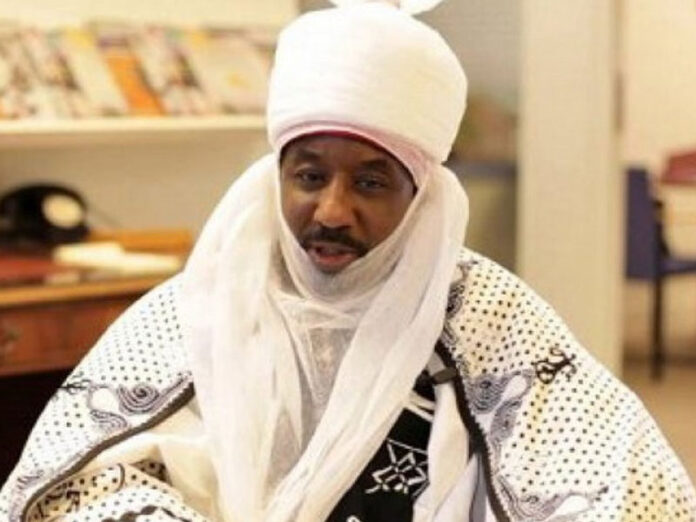Sanusi: “It Would Be Unfair to Blame Tinubu for Nigeria’s Economic Hardship”
• Former CBN governor defends subsidy removal, says no president could have sustained economy beyond May 2023
Emir of Kano, Muhammadu Sanusi II, says it would be unjust to blame President Bola Tinubu for Nigeria’s current economic challenges, stating that the country was already on the brink of collapse when the new administration took office on May 29, 2023.
Speaking during a virtual religious event on Sunday, the former Central Bank of Nigeria (CBN) governor said critics expecting him to condemn Tinubu were deliberately seeking opposition. He insisted that no leader could have sustained the economy without immediately removing fuel and forex subsidies, which he described as unsustainable burdens inherited from the previous administration.
Sanusi, who has been an outspoken critic of former President Muhammadu Buhari’s economic policies, said he had consistently warned of a looming crisis under the Buhari government. He reiterated that much of the current hardship stems from years of financial mismanagement, excessive borrowing, and printing of money.
“I would be unfair to God and man if I blame President Tinubu for this economic hardship,” Sanusi said. “The former administration ignored repeated warnings and advice. Debt servicing had already consumed 100% of our national revenue, and the Nigerian National Petroleum Company Limited (NNPCL) could no longer remit a kobo to the federation account.”
He revealed that the CBN printed over ₦3 trillion outside the banking system to sustain the Buhari administration through its final months, leaving the economy severely weakened.
“By May 29, 2023, the economy was already flashing red signals of total collapse. No president could have run Nigeria beyond six months under that structure without implementing painful reforms. Tinubu had no choice but to act fast,” he said.
Sanusi, who also served as Emir of Kano between 2014 and 2020 and was recently reinstated to the throne, argued that the subsidy removal and exchange rate unification were Nigeria’s only realistic options for survival.
“We were living a fake lifestyle, built on both foreign and domestic debt since 2012. The situation Nigerians are facing today is only the beginning—unless the right measures are put in place,” he warned, citing economic crises in Zimbabwe, Venezuela, and Germany as parallels.
While acknowledging that Tinubu is not above criticism, Sanusi emphasized that it would be dishonest to attribute the hardship to the current government, which he believes is dealing with the consequences of years of neglect.
“If I see any bad policy from this government, I will speak, but it is unfair to blame Tinubu for a crisis that didn’t start with him. The hardship Nigerians are facing now was inevitable.”
The respected Islamic scholar also urged Nigerians to manage their expectations and live within their means during this period of adjustment. He appealed to well-meaning individuals to support the vulnerable, describing it as a shared responsibility.
“This is not the time for extravagance. I urge citizens to live within their income, and those who can help others must do so,” he said.
Sanusi concluded by decrying the culture of corruption that flourished under the last administration, where individuals exploited forex arbitrage to enrich themselves, amassing wealth and properties abroad without any meaningful record of service.
“A boy who has no track record owns private jets and properties in Dubai and the UK simply because he was buying dollars at ₦400 and selling at ₦700. That’s the legacy of the last eight years,” he lamented.


